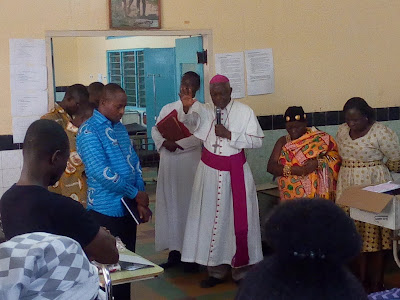The
Christian Health Association of Ghana (CHAG) has sent a distress call to
Government to address with dispatch the huge indebtedness of the National Health
Insurance Scheme (NHIS) to its health facilities.
CHAG is a faith-based
health network organisation comprising 21 Christian Church denominations and
over 183-member health institutions spread throughout the country. Established
in 1967, with 25 health institution, the Association which provides about 40 per
cent of health care in the country, has most of its facilities located in
remote areas, and most of its clients being NHIS subscribers.
According
to Mr. Peter Yeboah, Executive Director of CHAG, the Scheme owes its facilities
over GH¢ 100
million for services rendered to NHIS Members/Clients, spanning over eleven months.
In
an interview, he noted with concern that CHAG was overwhelmed by the level of indebtedness,
a situation he described as an “eminent humanitarian disaster of massive
proportion” if the indebtedness of the Scheme was not addressed in time.
“We
have gone beyond our endurance limit,” Mr Yeboah observed, stressing that “the
situation is so critical that basic healthcare services to mothers, children,
aged, poor, needy and the marginalised are affected.
The Executive Secretary
bemoaned the situation where suppliers of
medicines and other medical consumables were chasing and pestering the
facilities and even threatening legal suits to redeem the amounts owed by
facilities.
Elaborating
further, he noted that “our suppliers are unwilling to supply us with essential
consumables and medicines, our medical equipment are breaking down due to
inadequate funds for repairs/maintenance, medical services has become
unbearable, with life-saving infrastructures deteriorating”.
Due
to this development, he observed that physicians were compelled to issue
patients with prescriptions for them to go and buy the medicines from the
market.
He
said this was seriously affecting the quality of healthcare delivery in the
country, adding that it has gotten to the stage where “we are unable to
guarantee quality of medicines the patients are buying and taking.”
On
Government’s campaign promise to fix the challenges bedeviling the NHIS, the
Executive Secretary stated that CHAG appreciates Government’s intention, but
expressed worry about the fact that there was no road map of repayment plan and
settling the debts owed the health facilities three months after the new
administration took reins of governance.
He
noted that CHAG was more worried about the collateral damage the indebtedness
was having on the health care system in the country, as well as the dire
consequences it has on the economy, if the situation persists.
As
a result of these months of indebtedness to service providers, Mr Yeboah
observed that there was a “gradual loss of confidence in the health system, as
patients, NHIS members/clients are losing hope in health care delivery.”
He
said what was needed now was an urgent action by Government to salvage the
health system from an eminent collapse by settling the debts owed by the NHIS
to service providers.
Mr. Yeboah called for an
end to the chronic NHIS indebtedness, urging Government to make exigent intervention
to restore the health system.





















